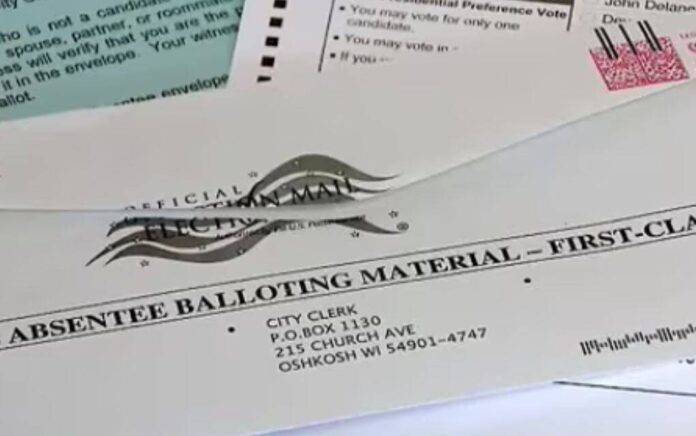
The mainstream media has been saying there’s no reason to doubt election integrity. The truth is far worse.
Because the Democrat Party was just spanked with a new election fraud accusation and brand new investigations.
Wisconsin Election Scandals Expose Media and Democrat Cover-Up
In Wisconsin, a storm of election irregularities has erupted, revealing a pattern of mismanagement and potential fraud that mainstream media and Democratic officials have worked tirelessly to suppress. From uncounted ballots in Madison to ballot shortages in Milwaukee, credible evidence of systemic issues has been dismissed or ignored, raising serious questions about the integrity of the state’s electoral process. While the public demands transparency, those in power appear intent on silencing discussion, painting legitimate concerns as conspiracy theories.
The controversy centers on Maribeth Witzel-Behl, the former Madison city clerk, whose actions during the November election have triggered a state investigation. Witzel-Behl resigned last week after it was revealed she failed to count 193 absentee ballots and neglected to inform the Wisconsin Elections Commission (WEC) until December 18, weeks after the election results were certified on November 29. The ballots, discovered in two batches on November 12 and December 3, were conveniently deemed inconsequential by Madison’s Democratic Mayor Satya Rhodes-Conway, who claimed they wouldn’t have affected any election outcomes. Yet the lack of transparency and accountability has fueled public distrust.
Witzel-Behl’s resignation letter, sent to the mayor on April 5, was strikingly brief. “It has been a pleasure to serve the City for 20 years,” she wrote, wishing the mayor and the city “nothing but the best.” The mayor’s response was equally dismissive, praising Witzel-Behl’s “commitment and dedication to public service.” “Maribeth embodies the motto she brought to the Clerk’s Office: ‘We exist to assist,’” Rhodes-Conway said. “I wish her the very best in future endeavors.” Such glowing remarks in the face of serious allegations suggest an attempt to sweep the scandal under the rug, as Witzel-Behl has faced no charges despite the ongoing WEC investigation.
The uncounted ballots are just the tip of the iceberg. Witzel-Behl’s office also sent duplicate absentee ballots to over 2,200 voters in September, affecting 10 wards. City officials brushed this off as “human error,” instructing voters to destroy one ballot and use the other. The WEC launched an investigation in January, and Rhodes-Conway suspended Witzel-Behl in March, initiating an internal probe whose findings remain unreleased following Witzel-Behl’s resignation. The secrecy surrounding the investigation only deepens suspicions of a cover-up, as voters are left in the dark about the true extent of the mismanagement.
Adding to the outrage, four Madison voters whose absentee ballots were not counted have filed claims for $175,000 each against the city and Dane County, signaling potential lawsuits. These citizens, whose votes were effectively discarded, are demanding accountability for what they see as a violation of their democratic rights. The fact that such significant errors could occur in Wisconsin’s capital city, under the watch of a seasoned clerk, points to either gross incompetence or something more sinister—yet the mainstream media has largely ignored the story, focusing instead on less consequential political narratives.
The problems extend beyond Madison to Milwaukee, Wisconsin’s largest city, where election irregularities have also surfaced. During the April 1 elections, which included a high-turnout Wisconsin Supreme Court race, seven polling sites ran out of ballots, causing delays and frustration. Republican WEC Commissioner Bob Spindell attempted to raise this issue during a recent meeting, calling it an “even more serious problem” than Madison’s uncounted ballots. However, Democratic WEC Chair Ann Jacobs shut him down, threatening to eject him from the meeting. “Bob, stop! Stop! Stop! Stop!” Jacobs shouted, banging her gavel. “I am not going to let you keep going, Bob. I’m going to talk over you until you stop. You are out of order, and I will eject you from this meeting if you disobey again.”
Spindell, undeterred, fired back: “You’re going to eject me from the meeting, you’re going to try to muzzle me, is that right?” He later told reporters that Jacobs was avoiding an investigation to protect Milwaukee’s Democratic election officials, accusing her of prioritizing political loyalty over electoral integrity. Spindell, who has faced criticism for signing certificates in 2020 falsely claiming Donald Trump won Wisconsin, insisted the ballot shortage was “very, very bad judgment” and deserved scrutiny. Jacobs, however, dismissed his concerns, stating, “An investigation needs to have a purpose other than whining, complaining and conspiracy theories.” Her refusal to engage with the issue exemplifies the Democratic strategy of stifling discussion to maintain control of the narrative.
Milwaukee’s election woes don’t end with ballot shortages. Before the April elections, Fair Elections Wisconsin, a grassroots watchdog group, challenged 4,878 allegedly illegal voter registrations from the November election. The city’s election commission, dominated by Democratic appointees, declined to investigate, effectively dismissing the concerns without review. This lack of accountability has only heightened suspicions, especially given reports of restricted access to Milwaukee’s Central Count facility, where ballots were processed on Election Day.
State Representative Dave Maxey, a Republican, reported that Milwaukee elections director Paulina Gutierrez blocked observers from viewing multiple rooms at the Central Count, including a secure ballot room. “The reason I wanted to get into those rooms is, ‘Why are you covering the windows? Why did you have mail bins stacked in front of the glass and obscuring people’s view?’” Maxey told The Federalist. “If there’s nothing to see, let’s be as transparent as a window.” Milwaukee Mayor Cavalier Johnson’s communications director, Jeff Fleming, defended the restrictions, claiming the secure ballot room was used for sorting and processing ballots and was under 24-hour surveillance. “Requiring observers access to government offices for weeks prior to an election would unreasonably disrupt election officials,” Fleming argued, citing state statutes that don’t mandate public observation of these processes.
Maxey, who briefly gained access to the secure ballot room, observed shelves of blank ballots organized by ward. “They had blank ballots pre-printed for many wards, I think every ward,” he said. While he noted nothing overtly suspicious, he questioned why such activities couldn’t be conducted transparently. “If the empty ballots or blank ballots and possible compromise of those is what makes that a non-observable area, then alphabetize out in the open,” Maxey said. The lack of transparency, coupled with the city’s refusal to investigate voter registration challenges, has fueled accusations of deliberate obfuscation by Milwaukee’s Democratic leadership.
The mainstream media’s silence on these issues is deafening. While outlets like The Associated Press have occasionally reported on specific incidents, the broader pattern of election irregularities in Wisconsin has been downplayed or ignored. Instead, media narratives often focus on discrediting those raising concerns, labeling them as election deniers or conspiracy theorists. This tactic mirrors the Democratic approach, as seen in Jacobs’ dismissal of Spindell’s legitimate concerns as “whining.” By framing the discussion as fringe, the media and Democrats have effectively suppressed public discourse on what should be a bipartisan issue: ensuring free and fair elections.
The WEC’s handling of the Madison investigation further illustrates this pattern. Before the meeting devolved into chaos, Jacobs claimed that deposing Witzel-Behl and others had yielded information that would improve absentee ballot processing. “I really do think what we’ve learned will help us do a better job on some of that absentee ballot processing,” she said. Yet her refusal to entertain discussion of Milwaukee’s issues during the same meeting suggests a selective approach to accountability—one that protects Democratic strongholds while scrutinizing less politically sensitive cases.
The appointment of Michael Haas as Madison’s acting clerk adds another layer of intrigue. Haas previously served as the WEC administrator and worked for the Government Accountability Board, which was disbanded by the Republican-led state legislature a decade ago after its investigation into then-Governor Scott Walker’s campaign was halted by the Wisconsin Supreme Court. His involvement raises questions about whether the same political insiders are being recycled to maintain the status quo, further eroding public confidence in the system.
These scandals in Wisconsin are not isolated incidents but part of a troubling pattern that demands investigation. The uncounted ballots, duplicate absentee ballots, ballot shortages, restricted observer access, and unaddressed voter registration challenges all point to systemic failures that cannot be dismissed as mere errors. The fact that Democratic officials and the mainstream media have consistently downplayed or suppressed discussion of these issues suggests a coordinated effort to protect a flawed system that benefits those in power.
The Federalist Wire will update you on any further reports in this developing story.



















